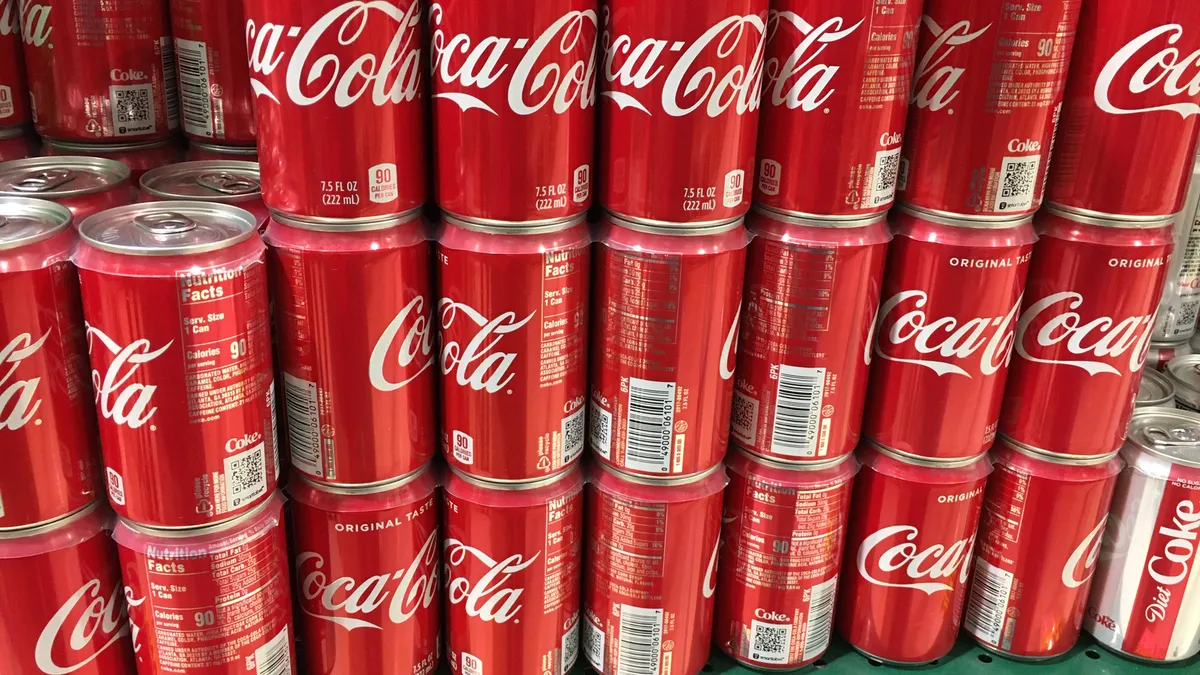UPDATE: July 1, 2020: Target, Mars and Volkswagen have joined the boycott, according to various reports, bringing the total list of boycotting brands to more than 240. In addition, Molson Coors will pause advertising on Facebook, Instagram and Twitter, while Anheuser-Busch does not plan to take part in the boycott "as of now," according to Ad Age.
UPDATE: June 30, 2020: Adidas, Beam Suntory and Colgate-Palmolive have joined the boycott, according to Stop Hate for Profit. In addition, HP announced that it is stopping U.S. advertising on Facebook, and The Clorox Company announced it will stop advertising with Facebook through December. Microsoft reportedly suspended its advertising on Facebook and Instagram in the U.S. in May and recently expanded that to a global pause, according to Axios.
Dive Brief:
- Coca-Cola, Hershey, Diageo, Levi Strauss & Co. and Birchbox are among the brands that joined the Stop Hate for Profit boycott of Facebook organized by the Anti-Defamation League (ADL) and other civil rights organizations, according to the website for the boycott. The list of participating companies includes nearly 100 names as of June 29, as more marketers pledge to not buy ads on the platform in July amid concerns about its role in spreading hate speech and misinformation.
- Coke extended its strategy to pause paid advertising on all social media platforms worldwide for at least 30 days, per a statement by Chairman and CEO James Quincey. The executive asked for greater transparency and accountability from social media partners, as the soft-drink company reassesses whether to change its advertising policies in a broader sense. Archrival PepsiCo has also quietly joined the movement, Fox Business reported.
- Starbucks, which hasn't officially joined the #StopHateForProfit boycott, still announced plans to pause advertising on all social media platforms over the weekend, and said it will hold both internal discussions and discussions with outside media outlets and civil rights groups on how to curb hate speech. The coffee chain will keep posting to its social media channels without paid promotion, CNBC reported.
Dive Insight:
What started as a call by civil rights groups to boycott Facebook in July has attracted an outpouring of major advertisers, including Unilever and Honda, and is now widening to cover the social network and its rivals, according to dozens of announcements and press reports in recent days. The boycott movement follows weeks of growing tensions between advertises and Facebook over its content-moderation policies since the killing of George Floyd while in police custody spurred global calls to end racism and police brutality.
While the growing movement has the potential to impact social media more broadly, Facebook — the largest social media platform by users and revenue — remains the primary focus. Advertisers are questioning whether they want to support Facebook, which several civil rights groups this month accused of profiting from divisive hate speech. The ADL, National Association for the Advancement of Colored People (NAACP), Color of Change, Common Sense, Free Press and Sleeping Giants partnered in the #StopHateforProfit campaign that asked businesses to stop advertising on Facebook in July. Some, like Unilever, have broadened the timeframe, with the CPG giant on Friday announcing it would pause all social media advertising on Facebook and Twitter until "at least" the end of the year.
Amid the growing pressure from marketers, Facebook on Friday said it would begin labeling political speech that violates its rules and take other steps to curb voter suppression and protect minorities from abuse, The Wall Street Journal reported. In a statement to the newspaper, Facebook said it spends billions of dollars a year on safety measures, and has banned 250 white-supremacist organizations from Facebook and Instagram. After Facebook's announcement, the Stop Hate for Profit campaign published a list of demands for Facebook to improve accountability, decency and support for victims of harassment, saying that the steps announced by Facebook don't go far enough.
The Facebook boycott has gained momentum since June 17, when the organizing groups took out a full-page ad in the Los Angeles Times that accused Facebook of allowing the incitement of violence against protesters "fighting for racial justice in America," giving white nationalists a platform and ignoring efforts to suppress voter turnout.
Outdoor retailers The North Face, Patagonia and REI were among the first companies to announce their support for the movement to boycott Facebook, followed by Unilever, American Honda, Verizon, Ben & Jerry's, Eddie Bauer, Levi Strauss and Canadian outdoor goods company Arc'teryx. Ad agency Goodby Silverstein also supports the movement. It's possible that many brands already had reduced their ad spending because of the coronavirus pandemic and economic slowdown, and joining a boycott is one way to show support for a social cause.
It's too early to tell how the boycott movement will affect Facebook, which is facing its biggest crisis since the Cambridge Analytica scandal invited scrutiny of the social network's effect on elections and resulted in a record $5 billion fine. Facebook has a diverse revenue base among 8 million advertisers worldwide, though many smaller businesses have faced serious threats from the coronavirus pandemic and resulting lockdowns.
Facebook has said that it doesn't make policy decisions based on revenue pressures, but it is working to persuade its biggest advertisers from halting their ad spending, per a separate Wall Street Journal report. Facebook executives have said in calls and emails with advertisers that they take the demands of civil rights groups seriously, the newspaper reported.














